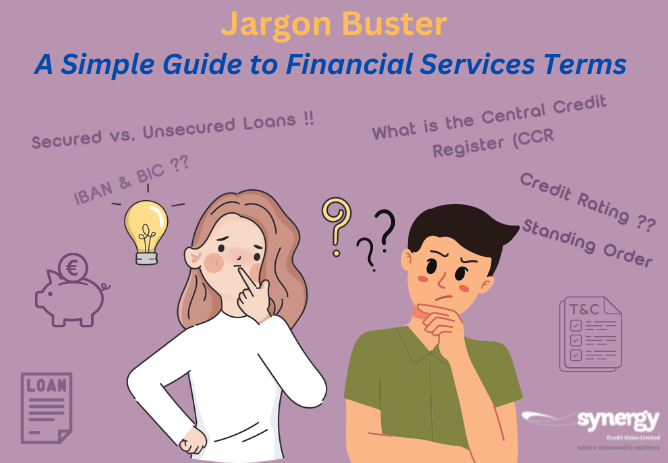18 June 2024
Financial Terms Made Simple
Financial Jargon Busters
What is an APR? What is the difference between a secured loan and an unsecured loan? What does it mean if I’m in arrears? These are all questions we ask ourselves at least once in our lives!
At Synergy Credit Union, we understand that financial terms can sometimes feel like a foreign language. That's why we're here to help!
We've broken down some of the most common financial terms you might encounter, explained in simple English.
To start off with:
APR (Annual Percentage Rate):
Imagine the APR as the true cost of borrowing over a year. It takes into account the interest rate and any fees associated with a loan. Lenders are required to show APR when advertising a loan. So, when comparing loan options, always consider the APR.
Secured vs. Unsecured Loans:
Think of a secured loan as borrowing money with collateral like your house. If you don't repay the loan, the lender can seize that asset. The idea behind a secured loan is a basic one. Lenders accept collateral against a secured loan to incentivize borrowers to repay the loan on time otherwise they have a right to claim the value of the loan, with whatever you have borrowed against
Unsecured loans rely on your good credit history and ability to repay. Examples of unsecured loans include personal loans, student loans, and credit cards.
Arrears:
This means you've missed a payment on a loan or bill. Falling into arrears can damage your credit score and lead to additional fees.
Making Everyday Transactions Easier
Direct Debit
- Controlled by the Payee: The company or organization you are paying (the payee) controls the payment. They can change the amount and date of payment, but they must notify you in advance.
- Flexibility: It's useful for variable amounts and irregular payment dates, such as utility bills or subscriptions where the amount might change.
Standing Order
- Controlled by the Payer: You, the person making the payment (the payer), control the payment. You set up the payment amount and the schedule (e.g., weekly, monthly), and only you can change or cancel it.
- Fixed Amount: It's ideal for regular, fixed payments like rent or mortgage payments, where the amount doesn't change.
Understanding Your Credit
Credit Rating:
This score reflects your creditworthiness, based on your past borrowing habits. A good credit rating ensures that you are eligible to borrow as long as you can show you can make the repayments each week or month. A poor credit rating will make it harder for you to get a loan in the future. Protect your credit rating by ensuring that you make all repayments on time and in full each week or month.
Central Credit Register (CCR):
This Irish database stores your credit information, allowing lenders to assess your loan eligibility. . It is possible to obtain your credit score/credit check free of charge from these agencies. See the CCR here: https://www.centralcreditregister.ie/
Other Important Terms
Balance: The amount of money currently in your account.
Credit: Borrowing money with the promise to repay later.
Deposit: Putting money into your bank account for safekeeping. However, a deposit can also refer to a portion of money used as security or collateral for the delivery of goods.
Fixed Rate: An interest rate that stays the same for a set period. This will be agreed prior to signing up to the product. Typically, this rate is only guaranteed for a certain period of time after which you would renegotiate, or moved to a variable rate.
Guarantor: Someone who agrees to repay your loan if you can't. We think for example that a student should get a loan in their own name, but they may need a guarantor if they can not show a source of income to repay the loan. By getting the loan in their own name they are building a credit score even though they may have a guarantor.
IBAN & BIC: Unique codes used for international money transfers. You’ll need these codes to send and receive payments.
Loan Interest Rate: In simple terms, an interest rate is rate charged by a lender of money or credit to a borrower. In short, from the borrower's point of view it is the 'cost' of borrowing, and from the lender's point of view it is the reward for lending. Or, to put it into an even simpler way, the rate of interest is the price of money.
Mortgage: A Deed you sign to create security over a house or land and sometimes over other types of property. For example, security in the form of a mortgage is usually given to a bank, building society or Credit Union to enable it lend to a borrower to finance the purchase of a property
Overdraft: Temporary access to funds beyond your account balance, usually with associated fees. Our current account has an overdraft facity available up to €5,000
Savings: Money you set aside for future needs or goals. A savings plan should always be included in your household or personal budget.
Loan Repayments: The periodic payments you make to pay back a loan, including principal and interest. In Synergy Credit Union unlike many other institutions we have flexible repayment times such as weekly, fortnightly or monthly to suit your income payments ( Members who get paid weekly )
Moneylender: A person whose business it is lending money to others. Moneylenders typically charge high rates of interest and as such you should only consider borrowing money from a regulated organisation. Should you borrow from an illegal moneylender, you may find yourself paying excessive rates of interest and should you fall into arrears, you may encounter unreasonable additional charges.
Common Bond: The members of any credit union have something in common. Typically it is where you live or work. It can also be the type of job you have. This is known as a “Common Bond” and will determine the credit union you can join. Synergy Credit Unions common bond is based on location so if you live, work or go to school in the area we serve you are entitled to join us. Synergy Credit Union’s common bond are the following areas and their surrounds : Araglen, Ballyduff, Ballyhooly, Castlelyons, Castletownroche, Conna, Glanworth, Glenville, Fermoy, Kilworth, Kildorrery, Leamlara, Rathcormac, Watergrasshill and surrounding areas.
In Cork City our common bond includes Tivoli, Lower Glanmire Road, Middle Glanmire Road, Horgan’s Quay, Patrick’s Quay, McCurtain Street, Wellington Road, Leitrim Street, Richmond Hill, Rathmore Park, Pope’s Road, Thomas Kent Park, Old Youghal Road, St. Luke’s and surrounding areas. See more information on joining HERE:
We're Here to Help!
If you have any questions about these terms or any other financial matters, Synergy Credit Union is here for you.
Don't hesitate to contact us – we're happy to help!
Phone: 0818 272927
Email: info@synergycu.ie








